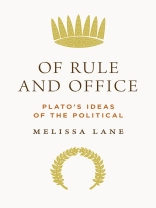A constitutionalist reading of Plato’s political thought
Plato famously defends the rule of knowledge. Knowledge, for him, is of the good. But what is rule? In this study, Melissa Lane reveals how political office and rule were woven together in Greek vocabulary and practices that both connected and distinguished between rule in general and office as a constitutionally limited kind of rule in particular. In doing so, Lane shows Plato to have been deeply concerned with the roles and relationships between rulers and ruled. Adopting a longstanding Greek expectation that a ruler should serve the good of the ruled, Plato’s major political dialogues—the Republic, the Statesman, and Laws—explore how different kinds of rule might best serve that good. With this book, Lane offers the first account of the clearly marked vocabulary of offices at the heart of all three of these dialogues, explaining how such offices fit within the broader organization and theorizing of rule.
Lane argues that taking Plato’s interest in rule and office seriously reveals tyranny as ultimately a kind of anarchy, lacking the order as well as the purpose of rule. When we think of tyranny in this way, we see how Plato invokes rule and office as underpinning freedom and friendship as political values, and how Greek slavery shaped Plato’s account of freedom. Reading Plato both in the Greek context and in dialogue with contemporary thinkers, Lane argues that rule and office belong at the center of Platonic, Greek, and contemporary political thought.
关于作者
Melissa Lane is the Class of 1943 Professor of Politics and a faculty member of the Program in Classical Philosophy at Princeton University. She is also the 50th Professor of Rhetoric at Gresham College. Her books include
Eco-Republic:
What the Ancients Can Teach Us about Ethics, Virtue, and Sustainable Living and
The Birth of Politics: Eight Greek and Roman Political Ideas and Why They Matter (both Princeton) and
Method and Politics in Plato’s “Statesman.”












